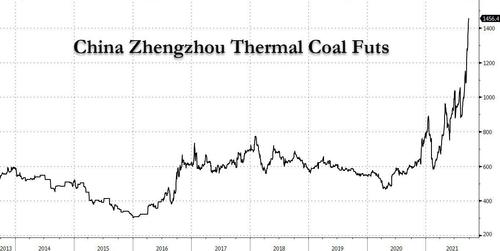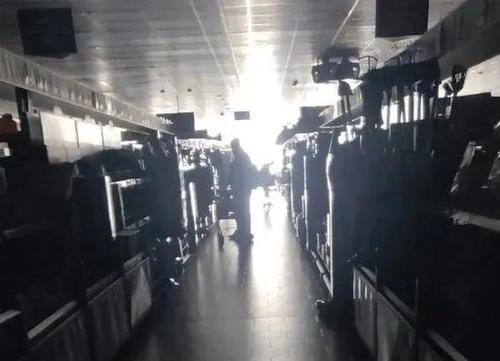Millions Of Chinese Residents Lose Power After Widespread, "Unexpected" Blackouts; Power Company Warns This Is "New Normal"
Just yesterday we warned that a "Power Supply Shock Looms" as the energy crisis gripping Europe - and especially the UK - was set to hammer China, and just a few hours later we see this in practice as residents in three north-east Chinese provinces experienced unannounced power cuts as the electricity shortage which initially hit factories spreads to homes.
People living in Liaoning, Jilin and Heilongjiang provinces complained on social media about the lack of heating, and lifts and traffic lights not working.
Northeast China's Shenyang, capital of Liaoning Province has been through a sudden and unexpected power curb. Meanwhile, dozens of provinces across the country are also facing power curb due to govt's pursuit to cut carbon emission even though the supply for coal remain adequate. pic.twitter.com/cX2h0x6s8Q
— Source Beijing (@SourceBeijing) September 26, 2021
Local media in China - which is highly dependent on coal for power - said the cause was a surge in coal prices leading to short supply. As shown in the chart below, Chinese thermal coal futures have more than doubled in price in the past year.

There are several reasons for the surge in thermal coal, among them already extremely tight energy supply globally (that's already seen chaos engulf markets in Europe); the sharp economic rebound from COVID lockdowns that has boosted demand from households and businesses; a warm summer which led to extreme air condition consumption across China; the escalating trade spat with Australia which had depressed the coal trade and Chinese power companies ramping up power purchases to ensure winter coal supply.
Then there is Beijing's pursuit of curbing carbon emissions - Xi Jinping wants to ensure blue skies at the Winter Olympics in Beijing next February, showing the international community that he's serious about de-carbonizing the economy - that has led to artificial bottlenecks in the coal supply chain.
China's carbon crackdown - #Beijing's effort to reduce emissions brings blackouts and forced factory closures.@willripleyCNN reports the #China power crunch and how companies like #Apple & #Tesla are being hit 👇 pic.twitter.com/mxly9VpQyW
— Julia Chatterley (@jchatterleyCNN) September 27, 2021
The coal price surge prompted the China Electricity Council to publish a statement saying that "to ensure winter coal supply, power companies continue to increase market purchases *regardless of cost* under the situation of substantial losses."
Whatever the reason, it's just getting started: as BBC reported, one power company said it expected the power cuts to last until spring next year, and that unexpected outages would become "the new normal." Its post, however, was later deleted.
At first, the energy shortage affected factories and manufacturers across the country, many of whom have had to curb or stop production in recent weeks. In the city of Dongguan, a major manufacturing hub near Hong Kong, a shoe factory that employs 300 workers rented a generator last week for $10,000 a month to ensure that work could continue. Between the rental costs and the diesel fuel for powering it, electricity is now twice as expensive as when the factory was simply tapping the grid.
"This year is the worst year since we opened the factory nearly 20 years ago," said Jack Tang, the factory's general manager. Economists predicted that production interruptions at Chinese factories would make it harder for many stores in the West to restock empty shelves and could contribute to inflation in the coming months.
Three publicly traded Taiwanese electronics companies, including two suppliers to Apple and one to Tesla, issued statements on Sunday night warning that their factories were among those affected. Apple had no immediate comment, while Tesla did not respond to a request for comment.
But over the weekend residents in some cities saw their power cut intermittently as well, with the hashtag "North-east electricity cuts" and other related phrases trending on Twitter-like social media platform Weibo.
The extent of the blackouts is not yet clear, but nearly 100 million people live in the three provinces.
In Liaoning province, a factory where ventilators suddenly stopped working had to send 23 staff to hospital with carbon monoxide poisoning.
There were also reports of some who were taken to hospital after they used stoves in poorly-ventilated rooms for heating, and people living in high-rise buildings who had to climb up and down dozens of flights of stairs as their lifts were not functioning. Some municipal pumping stations have shut down, prompting one town to urge residents to store extra water for the next several months, though it later withdrew the advice.
One video circulating on Chinese media showed cars travelling on one side of a busy highway in Shenyang in complete darkness, as traffic lights and streetlights were switched off. City authorities told The Beijing News outlet that they were seeing a "massive" shortage of power.

Social media posts from the affected region said the situation was similar to living in neighboring North Korea.
The Jilin provincial government said efforts were being made to source more coal from Inner Mongolia to address the coal shortage.
As noted previously, power restrictions are already in place for factories in 10 other provinces, including manufacturing bases Shandong, Guangdong and Jiangsu.
Of course, a key culprit behind China's shocking blackouts is Xi Jinping's recent pledge that his country will reach peak carbon emissions within nine years. As a reminder, two-thirds of China's electricity comes from burning coal, which Beijing is trying to curb to address climate change. While coal prices have surged along with demand, because the government keeps electricity prices low, particularly in residential areas, usage by homes and businesses has climbed regardless.
Faced with losing more money with each additional ton of coal they burn, some power plants have closed for maintenance in recent weeks, saying that this was needed for safety reasons. Many other power plants have been operating below full capacity, and have been leery of increasing generation when that would mean losing more money, said Lin Boqiang, dean of the China Institute for Energy Policy Studies at Xiamen University.
"If those guys produce more, it has a huge impact on electricity demand," Professor Lin said, adding that China's economic minders would order those three industrial users to ease back.
Meanwhile, even as it cracks down on conventional fossil fuels, China still does not have a credible alternative "green" source of energy. Adding insult to injury, various regions have been criticized by the government for failing to make energy reduction targets, putting pressure on local officials not to expand power consumption, the BBC's Stephen McDonell reports.
And while the blackouts starting to hit household power usage are at most an inconvenience, if one which may soon result in even more civil unrest if these are not contained, a bigger worry is that the already snarled supply chains could get even more broken, leading to even greater supply-disruption driven inflation.
As Source Beijing reports, several chip packaging service providers of Intel and Qualcomm were told to shut down factories in Jiangsu province for several days amid what could be the worst power shortage in years.

The blackout is expected to affect global semiconductor supplies - which as everyone knows are already highly challenged - if the power cuts extend during winter.
The NYT confirms as much, writing today that the electricity shortage is starting to make supply chain problems worse. The sudden restart of the world economy has led to shortages of key components like computer chips and has helped provoke a mix-up in global shipping lines, putting in the wrong places too many containers and the ships that carry them.
Nationwide power shortages have prompted economists to reduce their estimates for China's growth this year. Nomura, a Japanese financial institution, cut its forecast for economic expansion in the last three months of this year to 3 percent, from 4.4 percent.
It is not clear how long the power crunch will last. Experts in China predicted that officials would compensate by steering electricity away from energy-intensive heavy industries like steel, cement and aluminum, and said that might fix the problem. State Grid, the government-run power distributor, said in a statement on Monday that it would guarantee supplies "and resolutely maintain the bottom line of people's livelihoods, development and safety."
Maybe China should just blame bitcoin miners for the crisis to avoid public anger... alas, it can't do that since it already banned them and drove most of its technological innovators out of the country.
Commenti
Posta un commento